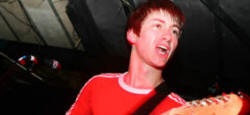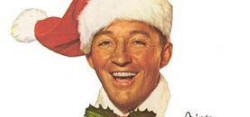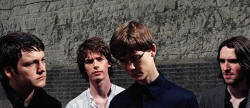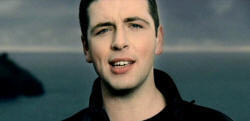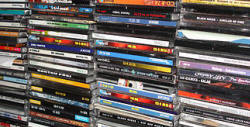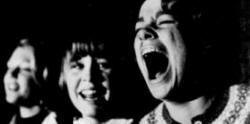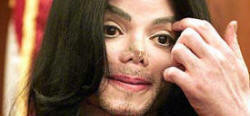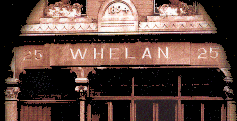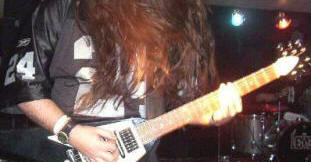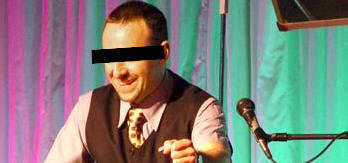This opinion article was first published on CLUAS in March 2005
CLUAS Opinion
The Scene Around Here...
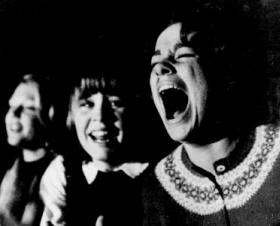 In
his first CLUAS Opinion piece Daragh Murray offers his view that it's not the tunes
or bands on the Irish scene that have suddenly lost their passion but it's the gig-going public that have changed.
A demanding audience is as crucial to a thriving music scene as talented
musicians. And maybe it is even more important. Take it away Daragh...
In
his first CLUAS Opinion piece Daragh Murray offers his view that it's not the tunes
or bands on the Irish scene that have suddenly lost their passion but it's the gig-going public that have changed.
A demanding audience is as crucial to a thriving music scene as talented
musicians. And maybe it is even more important. Take it away Daragh...
Some say that rock music, at least rock music with the balls to look you in the
eye and force a sigh, is dead and gone. They claim that it died on a couch with
Sid Vicious, in a lonely hotel room with Janis, growing cold in a bath with Jim
Morrison or twitching on a puke-stained bed with Bonzo Bonham.
Never mind the bollocks. Rock music never died, it's still alive and kicking, still
got that primeval power, the ability to loosen up a square and make a drunk man
high. Sure there's a lot of stuff polluting the air waves, but hell, the Osmonds
were number one while Zeppelin rampaged through America, stopping only for a quick
snort and a little red snapper fun. The Ramones and The Sex Pistols were spitting
out a new social phenomenon while Disco was going up its own nose in Studio 54.
Simply Red was riding high in the charts while the Stone Roses released a work of
unparalleled beauty.
It's not that, in Ireland, the tunes or the bands have suddenly lost their passion.
It's that we, the gig going public, have changed. We go to a gig demanding to be
entertained, expecting nothing, and contributing even less. The air is rife with
cynicism, stale with heavy pseudo-intellectual-all-knowing arrogance. Bands are
written off with flippant one-liners, singers are scorned for being over the top,
or derided for being stand-offish, and always, inescapably, someone will talk about
the 'good old days.'
The truth is that while music defines a scene, it doesn't make it.
In the 50s it was the breaking down of former social norms as a new wave, heralded
by the end of the war, and soundtracked by the electric blues of artists such as
Chuck Berry and Muddy Waters, that lured teenagers away from the diners and drive-ins
and into the sweaty excess of the juke joint. In the 60s it was taken a step further,
made 'hip'. Bobby Dylan came to New York, revitalised the 4th street folk scene,
and then turned it on its ear in a glorious maelstrom of electric guitars, out of
place organs, and amphetamine psychosis poetry. The Beatles started the 'British
Invasion' by making the leap from the Cavern to Shea Stadium and forging a path
for bands such as the Animals, the Kinks, the Who and the Rolling Stones.
In San Francisco a strange new sound emerged. It was a sound forged at Ken Kesey's
acid tests, in low rent apartments around Haight-Ashbury, in the furthest reaches
of minds newly opened to the lysergic experience and made aural by The Jefferson
Airplane, the Grateful Dead, Big Brother & the Holding Company, and the New Riders
of the Purple Sage. Just a few hours drive down the coast, Los Angeles gave us the
intricate wonders of Love, and the sheer awesomeness that was the Doors. Back in
England, Carnaby Street threw up the Sex Pistols while the slums of Manchester offered
up the Stone Roses and the Happy Mondays, steaming warehouses and nights that stretched
long past dawn. None of these bands just appeared like manna from heaven, they came
from a 'scene', be it the cotton fields, Chicago, Hamburg, Haight-Ashbury, the Whiskey,
the Factory or the famed Dandelion Market. It was a ground swell of interest, an
eager fan base and a vibrant happening that gave these bands their voice, forged
their identity, let them go onto greatness.
It is this scene that we are missing today in Dublin. Maybe we need a new drug,
but I don't think that's strictly necessary. As cliché as it sounds, good music
is as powerful drug as any and a hell of a lot less hassle to get hold of. People
just need to find 'that tune' the one that will always bring a smile to your face
and knock you back with its beauty. For me it's Santana's 'Samba Pa Ti,' the suspense
when that first crescendo never quite makes it, and the sheer orgasmic wonder when
it finally breaks through and that organ starts to wail. Maybe I'm performing below
par between the sheets, or maybe it is just that good. And there isn't any single
tune. Beauty can be found in way too many songs to name, in the way Caleb Followill
rumbles his voice, in the rigid structure of the Strokes or most importantly in
the live presence of an unknown band getting turned on in a crappy venue every weekend
of the year.
People will always put out good songs, the odds are in our favour there, but it's
the gigs that force tunes into perspective and make them great. It's the gigs that
get bands signed. How many times have you heard an album, only to have a band turn
it on its head at a gig and infuse it with a whole new meaning? One of the best
gigs I've ever been to was the Strokes at the Olympia, not my favourite band by
any means, but all out madness. Pure Jack Daniels, heaving bodies, sweaty, balls
out rock and roll.
It's up to us, the audience, to make a gig great. Ask any band, they play the same
tunes every night, but a show can vary from laid back cabaret to all out Roman Orgy.
Energy is what makes rock and roll, it's what makes the hair stand up on the back
of your neck and turns rock stars into sex gods. If a band has something that makes
you tick then tick.
Take a look around you next time you go to a gig in Eamon Doran's, the Hub, Voodoo
Lounge or any of the other venues around town. Take a look at how many people are
there to be cool, and just remember, that cool is overrated, cool people idolise
the freaks, the nuts, the outcasts. F**k 'em all.
Let your hair down, take another drink, and let go.
Daragh Murray
![]() Check out
the discussion this article provoked on the
CLUAS discussion board.
Check out
the discussion this article provoked on the
CLUAS discussion board.
Previous CLUAS Opinion pieces...
| Dateline: January 2006 | |
|
|
|
| Dateline: December 2005 | |
|
|
|
|
What Pop Music Can Teach Us About The Spirit Of Christmas... |
Dateline: December 2005 |
|
|
|
| Dateline: December 2005 | |
|
|
|
|
Homosexuality in pop music and the taboos that still surround it... |
Dateline: September 2005 |
|
|
|
| Dateline: June 2005 | |
|
|
|
| Dateline: May 2005 | |
|
|
|
| Dateline: March 2005 | |
|
|
|
| Dateline: February 2005 | |
|
|
|
| Dateline: January 2005 | |
|
|
|
| Dateline: December 2004 | |
|
|
|
| Dateline: November 2004 | |
|
|
|
| Dateline: October 2004 | |
|
|
|
| Dateline: October 2004 | |
|
Roddy Doyle said recently in an interview in The Guardian that Ireland doesn't produce great musicians. Considering that he is currently promoting a novel centred on Louis Armstrong and American jazz, it's possible that he may have been quoted out of a very broad context. Nonetheless, he has a valid point. Read the full article... |
|


